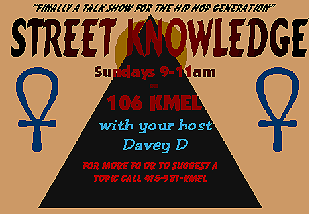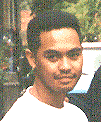


 Last Friday commemorated the 100th anniversary of Philippine independence.
And four powerful Filipino activists were on the panel to talk about in on
last Sunday's edition of Street Knowledge.
The four guests were Kawal Ulanday of the League of Filipino Students,
Filipino cultural consultant Mel Orpilla, community activist K.K. Baby and
Wilma Consul of the Teatro Nang Tanang (Tagalog for Theatre for Everyone)
organization. Last Friday commemorated the 100th anniversary of Philippine independence.
And four powerful Filipino activists were on the panel to talk about in on
last Sunday's edition of Street Knowledge.
The four guests were Kawal Ulanday of the League of Filipino Students,
Filipino cultural consultant Mel Orpilla, community activist K.K. Baby and
Wilma Consul of the Teatro Nang Tanang (Tagalog for Theatre for Everyone)
organization.The Philippine community is the largest community outside the Philippines and the anniversary plans to be commemorated the best possible way. "100 years ago, they were able to declare their independence from Spain," said host Davey D. "It's been a struggle for a long time for the Philippines to get their independence at least from Spain." Members of the Filipino community plan to celebrate the event. Consul clarified that the 100th anniversary is not a celebration. "This is a commemoration," Consul said. "What are we celebrating?" The discussion began when Davey D brought up the three most important names in Philippine history and independence. One of them was Dr.Jose Rizal, who began the 'Propaganda Movement'. "He did start something called the 'Propaganda Movement,'" Orpilla said. "It was really a nationalist move. He was the first Filipino to start having Filipinos call themselves Filipinos. Before that, we were called Indios by the Spaniards." "Jose Rizal is often compared to Martin Luther King," Davey added. "Well, you can say that Martin Luther King was the Jose Rizal of Black Americans because Jose preceeded him." The second name mentioned was Andres Bonafacio, who founded a secret society to overthrow the Spaniard government. "He was among the second people in the Philippines," Ulanday said. "In 1892 was when they suffered thought the most vicious conditions from the Spanish. So the Filipinos decided that it was time to organize underground and prepare themselves for armed resistence against the Spanish." "King, he took a more non-violent approach while Bonafacio was like, no, let's kick some ass," Davey added. Emilio Aguanado was the third name mentioned. "Aguanado wasn't exactly like a peasant like Bonafacio was," Ulanday said. "He was the one that made the proclamation ... interesting thing about this proclamation is that Aguanado proclaimed that the mighty humane North American government will be protecting the Philippines and also help defend the Philippines from Spanish rule and help overthrow." The discussion continued with the history of the first Filipinos in the U.S. Orpilla, who had his history books in front of him, was on top of his heritege. "We started the first Filipino settlements (in New Orleans) in 1763," Orpilla said. "And we called ourselves Filipino Cajuns. But the first recorded landing of a Filipino in the United States was October 18, 1557. So we have a long legacy." There remains to be a large Filipino population in New Orleans as of today. "It's not something you read about in the history books," Davey added. "I wonder why." Another issue is that most Filipinos, particuarly one who were born in the U.S., are lost in identity. "It's interesting because a lot of young Filipinos don't know their history," Davey said. "The first people of the Philippines came across land bridges during the Ice Age about 30,000 to 50,000 years ago," Orpilla said. "These people came from Africa. They settled in the Philippines and were called Aitas ... but the Spaniards called them Nigritos, which means little black men. Because originally, they grew up to five feet tall." "Some Filipinos don't want to acknowledge that," Consul added. "And that's the colonia mentality. That to be white and have this pointy nose instead of having that flat Filipino nose you got, people think you're prettier because you're mestizo looking." K.K. broke down the number of misconceptions about Filipinos. Among them were that all Filipinos are Catholic, which is not true at all. "We have Muslims, we have Budists, we also have Jewish people from the Philippines," K.K. said. "We actually worship nature. That's one of the first religions in the Philippines." "We were native people," Orpilla added. "And like native people in Africa and other parts of the world, our religions and gaws were tied to nature." Another question was if Filipinos are now cohesive. "In the colonia mentality, everyone wants to get along," K.K. said. "But you're casted into this variety of obstacles. You know, like: 'you have an accent', or, 'you sound American, but yet, you don't look American'. Those things are put upon us and we don't really know how to act or how to react." "It's important to know that even in the Philippines, the people over there have never really been united," Orpilla said. "We have all these tribes throughout the 700 different islands, we speak over 100 different dialects. We're separated by water, by mountain ranges, by jungles. We suffer from colonial mentality and we import that back here to America. And then we have another culture here called the Filipino-American culture that sometimes conflicts with the Filipino immigrant community. So you have all these different forces coming together and I don't think that being unified is something that we can achieve at this point. Maybe in a couple of generations." "We're all from different organizations," Consul added. "And we're trying to unite. And I think it's gonna take us, our generation ... and people who are getting what we're saying out there to make this community grow and be stronger and be heard." Other questions lingered over everyone's heads. Among them were: Are Filipinos really independent? And what's instore for all Filipinos as we approach the 21st century as well as over the next 100 years? "You got Filipino mayors now," K.K. said. "You got doctors, lawyers, people working at City Hall. So they figure that 'you made it, you're up there in the world.' But it's not. Not mentally. We're not there yet." "The mentally is the key word," Davey said. It's important to understand Filipino, as well as other people's, history. Because in order to go wherever you want to go in life, a road must be built. And it takes history and the understanding of that history to determine where your future will lie. If you have any ideas that should be a concern on Street Knowledge or if you would like a copy of Street Knowledge News, Email Chris Navalta at; Christyle1@aol.com. Chris Navalta of The Vallejo Times Herald
|